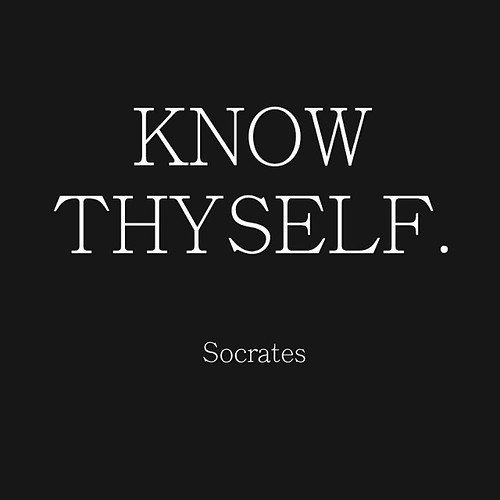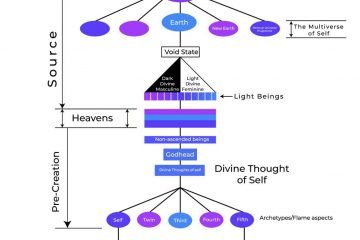
Click below to listen to this article:
Is self-knowledge the key to spiritual transcendence?
This article will explore the notion that spiritual development is almost possible without self-knowledge, we will look at the barriers to self-knowledge that most people face and suggest ways to overcome those barriers.
One of the questions that many spiritual seekers ask is whether self-knowledge is necessary for spiritual transcendence. The answer may depend on how one defines self-knowledge and spiritual transcendence, but some great thinkers have suggested that without knowing self, all the spiritual practices in the world will not help us attain spiritual transcendence.
For example, Socrates famously said, “The unexamined life is not worth living” (Plato, 1997, p. 38). He believed that self-knowledge was the key to wisdom and virtue, and that without it, one could not achieve happiness or harmony with the divine.
Similarly, Carl Jung, the founder of analytical psychology, wrote, “He who looks outside dreams; he who looks inside awakes” (Jung, 1961, p. 3). He argued that self-knowledge was essential for psychological growth and individuation, which he considered as a form of spiritual transcendence. He also proposed the concept of the collective unconscious, which connects all humans to a deeper level of reality beyond the ego.
Another example is Eckhart Tolle, a contemporary spiritual teacher and author of The Power of Now. He stated, “Knowing yourself is to be rooted in Being, instead of lost in your mind” (Tolle, 1999, p. 31). He suggested that self-knowledge was not about accumulating information or concepts about oneself, but about becoming aware of one’s true nature as pure consciousness. He claimed that this awareness was the gateway to spiritual transcendence and liberation from suffering.
Others who have agreed with his emphasis on self-knowledge and self-acceptance as the basis of spiritual growth include Hillman, 1975; Moore, 1992.
However, it seems most of us tend to avoid knowing self, and instead attach ourselves to beliefs that they can attain spiritual transcendence via alternative means. As Jung said:
“People will do anything, no matter how absurd, in order to avoid facing their own Souls. They will practice Indian yoga and all its exercises, observe a strict regimen of diet, learn theosophy by heart, or mechanically repeat mystic text from the literature of the whole world – all because they cannot get on with themselves and have not slightest faith that anything useful could ever come out of their own Souls. Thus, the soul has been turned into a Nazareth Gradually from which nothing good can come. Therefore, let us fetch it from the four corners of the earth – the more far-fetched and bizarre it is the better.” ~ Carl Jung, Psychology and alchemy, CW 12, Page 99
When Jung said, “People will do anything, no matter how absurd, in order to avoid facing their own Souls” (as cited in Ideapod, 2019), he meant that most people are afraid of confronting their unconscious, which is the source of their true selves.
He believed that the unconscious is not something to be suppressed or ignored, but rather something to be explored and integrated into one’s conscious awareness. He argued that the growth of the mind is the widening of the range of consciousness, and that each step forward is a painful and laborious achievement (Jung, 1964). Furthermore, he also suggested that the dream is the theatre where the unconscious reveals itself, and that by interpreting our dreams we can gain access to our innermost sanctum of the soul (Jung, 1964).
Moreover, when Jung said, “Nazareth Gradually”, he was referring to the soul as a place that has been neglected and dismissed by modern society, which values rationality and materialism over spirituality and intuition. He argued that the soul is the source of creativity, meaning and wholeness, and that it should be retrieved from the “four corners of the earth”, meaning from diverse and unconventional sources of wisdom (Jung, 1968, p. 99). He also warned that ignoring the soul would lead to psychological problems, such as neuroses, emptiness and loss of direction (Jungian Center, n.d.). By using the metaphor of Nazareth, he was alluding to the biblical phrase “Can anything good come out of Nazareth?” (John 1:46), which expressed the prejudice and scepticism that some people had towards Jesus’ hometown. Jung was suggesting that the soul, like Nazareth, is often underestimated and overlooked, but it can also produce something good and valuable if we pay attention to it (Carl Jung Depth Psychology, 2020).
Why people tend to avoid themselves
One of the reasons why people tend to avoid knowing themselves fully is that they fear confronting their own shadows, the dark and repressed aspects of their personality that they have denied or projected onto others (Jung, 1963). As Jung said, “Knowing your own darkness is the best method for dealing with the darkness’s of other people” (p. 101).
Another reason is that they are afraid of losing their identity and sense of security by acknowledging the unconscious forces that influence their behaviour and decisions. Jung (1921) described the unconscious as “everything of which I know, but of which I am not currently thinking; everything of which I was once conscious, but have now forgotten; everything perceived by my senses, but not noted by my conscious mind; everything which, involuntarily and without paying attention to it, I feel, think, remember, want, and do; all the future things which are taking shape in me and will sometime come to consciousness” (p. 3). To access this vast and unknown realm of the psyche requires courage and curiosity, as well as a willingness to change and grow. Jung (1963) also stated, “One does not become enlightened by imagining figures of light, but by making the darkness conscious” (p. 101).
Eckhart Tolle suggested that people are attached to an image of themselves that is not authentic (Tolle, 2004). They may fear losing their identity or their sense of success if they confront their true-self. As Tolle (2004) said, “Living up to an image that you have of yourself or that other people have of you is inauthentic living.” Another possible reason is that they are unaware of the power of the present moment and the potential for change that it offers. They may be stuck in the past or the future, which prevents them from being fully present and aware of their inner reality. Tolle (2004) stated, “All you need to know and observe in yourself is this: Whenever you feel superior or inferior to anyone, that’s the ego in you.” He suggested that by becoming more mindful and conscious of their thoughts and emotions, people can transcend their ego and discover their true-self.
Other reasons why people may fear knowing themselves are that they are influenced by social conformity, peer pressure and media promoting unrealistic self-ideals. Social conformity is the tendency to adopt the norms, values and behaviours of the majority group to fit in and avoid rejection (Cialdini & Goldstein, 2004). Peer pressure is the influence that peers exert on each other to conform to their expectations and preferences, especially in adolescence (Brown, 2004). Media promoting unrealistic self-ideals are the images and messages that are disseminated through various channels, such as social media, magazines, television and advertising, that portray idealized standards of beauty, success and happiness that are often unattainable and harmful for one’s self-esteem and body image (Grabe, Ward & Hyde, 2008).
These factors can contribute to people’s fear of knowing themselves because they may create a discrepancy between their true-self and their ideal-self, or how they think they should be. This discrepancy can cause negative emotions, such as anxiety, shame and guilt, and lower one’s self-worth and self-acceptance (Higgins, 1987). Moreover, these factors can also discourage people from exploring their own identity, interests and values because they may fear being judged, criticized or rejected by others if they deviate from the norm or the expectation (Ryan & Deci, 2000). Therefore, people may prefer to conform to external standards rather than to know themselves.
Some quotes that support these reasons are:
– “We conform because we believe that other’s interpretation of an ambiguous situation is more accurate than ours and will help us choose an appropriate course of action” (Cialdini & Goldstein, 2004, p. 597).
– “Peer pressure is not simply a matter of individual susceptibility to group influence but also reflects the extent to which adolescents have internalized the values and goals of their peer culture” (Brown, 2004, p. 171).
– “The media presents a barrage of images that tell women how they should look in order to be valued in society. These images often depict women who are thin, young, attractive and successful” (Grabe et al., 2008, p. 6).
Some quotes that illustrate their views are:
– “I always compare myself to others on social media and feel like I’m not good enough. I wish I could look like them or have their lives” (Anonymous user quoted in The Guardian, 2019).
– “I feel like I have to act a certain way around my friends, or they will make fun of me or exclude me. I don’t always agree with them, but I don’t want to lose them” (Anonymous teenager quoted in Ipsos, 2019).
– “I don’t really know who I am or what I want. I just follow what everyone else is doing or what they tell me to do. I’m afraid to be different or to disappoint them” (Anonymous student quoted in BBC, 2019).
Transcendence through vulnerability
For many people, these pressures and fears will prevent them from understanding themselves, which leads to a negative spiral to their sense of well-being, until they effectively hit a “rock-bottom” point, which is so uncomfortable that they are forced to overcome their fear of knowing self, and adopt a more transcendence outlook.
self-transcendence theory offers an explanation of this. According to this theory, human beings have an innate tendency to seek meaning and purpose beyond themselves, and by transcending their self-interests and ego-boundaries, they can achieve a higher level of well-being, creativity and altruism (self-transcendence.org, 2023).
However, this process also involves confronting one’s own limitations, mortality, suffering and existential questions, which can trigger fear, anxiety and resistance (Reed, 1991). Therefore, some individuals may avoid or deny the opportunity to transcend themselves and remain stuck in their narrow sense of self.
However, when they face a situation that challenges their self-concept or world-view, such as a crisis, a loss, a trauma or a peak experience, they may experience such intense discomfort that they are forced to acknowledge their vulnerability and open themselves to new possibilities of growth and transformation (Yaden et al., 2017).
This can be seen as a moment of self-transcendence, where the individual overcomes the fear of knowing themselves and moves in a transcendent trajectory towards a more holistic and integrated sense of self and reality.
How to overcome the fear of knowing yourself
One of the ways in which individuals can overcome their fear of knowing themselves is to embrace their capacity to create, to endure, to transform, and to love. According to Okri (n.d.), “The most authentic thing about us is our capacity to create, to overcome, to endure, to transform, to love, and to be greater than our suffering.” By acknowledging their creative potential and their resilience, individuals can transcend their limitations and their suffering.
Another way is to embark on the journey within and to accept oneself as one is. Rilke (n.d.) wrote, “The only journey is the journey within.” Rogers (n.d.) added, “The curious paradox is that when I accept myself just as I am, then I can change.” By exploring their inner world and accepting their flaws, individuals can grow and change for the better.
A third way is to conquer fear and choose growth over safety. Maslow (n.d.) stated, “One can choose to go back towards safety or forward towards growth. Growth must be chosen again and again; fear must be overcome again and again.” By overcoming fear and choosing growth, individuals can achieve wisdom and Self-actualization.
References
Brown, B. B. (2004). Adolescents’ relationships with peers. In R. M. Lerner & L. Steinberg (Eds.), Handbook of adolescent psychology (2nd ed., pp. 363–394). Hoboken, NJ: Wiley.
Carl Jung Depth Psychology. (2020). The soul As A Nazareth. https://carljungdepthpsychologysite.blog/2020/08/16/the-soul-as-a-nazareth/
Cialdini, R. B., & Goldstein, N. J. (2004). Social influence: Compliance and conformity. Annual Review of Psychology, 55(1), 591–621.
Fromm, E. (1959). Sigmund Freud’s mission: An analysis of his personality and influence. New York: Harper & Row.
Grabe, S., Ward, L. M., & Hyde, J. S. (2008). The role of the media in body image concerns among women: A meta-analysis of experimental and correlational studies. Psychological Bulletin, 134(3), 460–476.
Higgins, E. T. (1987). Self-discrepancy: A theory relating self and affect. Psychological Review, 94(3), 319–340.
Hillman, J. (1975). Re-visioning psychology. New York: Harper & Row.
Ideapod. (2019). 70+ Carl Jung quotes (to help you find yourself). Retrieved from https://ideapod.com/carl-jung-quotes/
Ipsos. (2019). Majority (59%) of Canadian teen girls feel pressure to conform to unrealistic expectations about what it means to “be a girl”. Retrieved from https://www.ipsos.com/en-ca/news-polls/teen-girls-pressure-unreal
Jung, C. G. (1964). The archetypes and the collective unconscious (R. F. C. Hull, Trans.). Princeton, NJ: Princeton University Press.
Jung, C. G. (1968). Psychology and alchemy (2nd ed., Vol. 12). Princeton University Press. (Original work published 1944)
Jung, C. G. (1961). Memories, dreams, reflections. Vintage Books.
Jung, C. G. (1921). psychological types. Routledge & Kegan Paul.
Jungian Center for the Spiritual Sciences. (n.d.). Jung on soul Tending. https://jungiancenter.org/jung-on-soul-tending/
Marcuse, H. (1955). Eros and civilization: A philosophical inquiry into Freud. Boston: Beacon Press.
Maslow, A. (n.d.). Quote by Abraham Maslow. Retrieved December 9, 2023, from https://www.goodreads.com/quotes/1326-one-can-choose-to-go-back-towards-safety-or-forward
Moore, T. (1992). care of the soul: A guide for cultivating depth and sacredness in everyday life. New York: HarperCollins.
Okri, B. (n.d.). Quote by Ben Okri. Retrieved December 9, 2023, from https://www.goodreads.com/quotes/1132-the-most-authentic-thing-about-us-is-our-capacity-to
Plato. (1997). Apology. In J. M. Cooper (Ed.), Plato: Complete works (pp. 17-36). Hackett Publishing Company.
Reed, P. G. (1991). self-transcendence and mental health in oldest-old adults. Nursing Research, 40(1), 5-11.
Rilke, R. M. (n.d.). Quote by Rainer Maria Rilke. Retrieved December 9, 2023, from https://www.goodreads.com/quotes/1050-the-only-journey-is-the-journey-within
Rogers, C. (n.d.). Quote by Carl Rogers. Retrieved December 9, 2023, from https://www.goodreads.com/quotes/1065-the-curious-paradox-is-that-when-i-accept-myself-just
Ryan, R. M., & Deci, E. L. (2000). Self-determination theory and the facilitation of intrinsic motivation, social development, and well-being. American Psychologist, 55(1), 68–78.
self-transcendence.org. (2023). self-transcendence theory in practice – social care. Retrieved from http://self-transcedence.org/self-transcendence-theory-in-practice-social-care
The Guardian. (2019). Social media only exacerbates pressure on body image – it’s time to take a break. Retrieved from https://www.theguardian.com/mental-health-supplement-2019/2019/may/17/social-media-only-exacerbates-pressure-on-body-image-its-time-to-take-a-break
Tolle, E. (1999). The power of now: A guide to spiritual enlightenment. New World Library.
Yaden, D. B., Haidt, J., Hood Jr., R. W., Vago, D. R., & Newberg, A. B. (2017). The varieties of self-transcendent experience. Review of General Psychology, 21(2), 143-160.




0 Comments